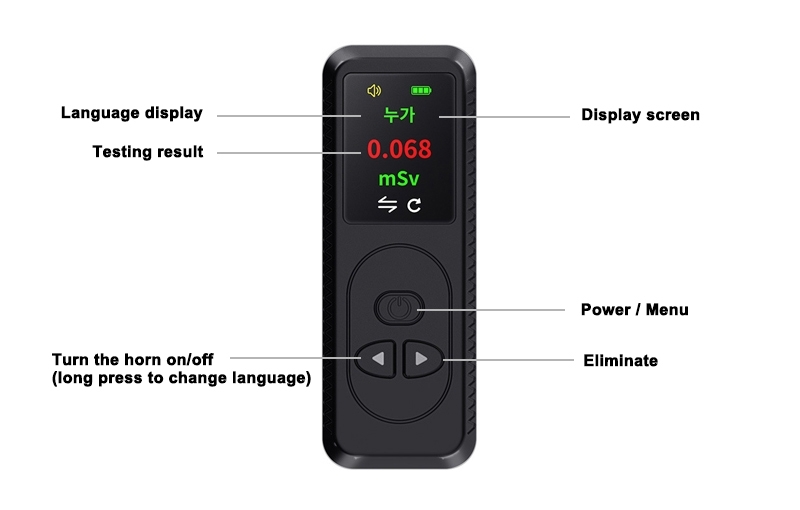A nuclear radiation detector, often referred to simply as a radiation detector, is a device used to detect and measure the presence and intensity of ionizing radiation. Nuclear radiation is a common source of environmental contamination that has a serious impact on human health and the environment. To protect people's safety and the sustainable development of the environment, it is crucial to select appropriate nuclear radiation monitoring equipment and use it correctly. In this paper, we will discuss how to choose suitable nuclear radiation monitoring equipment.
How to Choose
Choosing the right nuclear radiation detector involves several important considerations, as it depends on the specific application, types of radiation to be detected, sensitivity requirements, and budget constraints. Here are the steps to guide you through the selection process.
- Identify the Types of Radiation: Determine the specific types of radiation you need to detect, such as alpha particles, beta particles, gamma rays, or neutrons. Different detectors are suitable for different types of radiation.
- Sensitivity: The sensitivity of the equipment is an important factor. Different equipment has different responsiveness to different types of radiation. For example, some equipment may be sensitive to y-rays and less responsive to alpha and beta rays. Therefore, it is necessary to select equipment with appropriate sensitivity according to actual needs
- Measuring range: The measuring range of the equipment is also a key factor. The intensity of nuclear radiation can vary over different ranges, from weak background radiation to high-dose sources. Therefore, choosing equipment with a wide measuring range ensures accurate measurements in all situations.
- Reliability and accuracy: The reliability and accuracy of the equipment is also a factor to consider. When selecting equipment, choose equipment produced by a reliable manufacturer and make sure it can be measured with high accuracy. In addition, maintenance and calibration of the equipment is key to maintaining its reliability. Regular maintenance and calibration of the equipment will ensure that it is always in optimum working condition.
- Application: Consider the specific application in which you'll use the detector, whether it's for medical, industrial, environmental, research, or security purposes. Different applications may require different detector characteristics.
- Detector Types: Familiarize yourself with various types of radiation detectors, such as Geiger-Muller counters, scintillation detectors, ionization chambers, solid-state detectors, proportional counters, and neutron detectors. Each has its strengths and weaknesses.
- Budget: Establish a budget for the detector. The cost of radiation detectors can vary significantly, so it's essential to choose a detector that meets your requirements without exceeding your budget.
- Size and Portability: Consider the size and portability of the detector. Depending on your needs, you may require a handheld, portable, or laboratory-sized detector.
- Environmental Conditions: Take into account the environmental conditions where the detector will be used. Some detectors are better suited for extreme conditions, such as high radiation levels or harsh environments.
- Calibration and Maintenance: Determine how easy it is to calibrate and maintain the detector. Regular calibration and maintenance are essential for accurate measurements.
- Support and Warranty: Check the availability of technical support and the warranty offered with the detector, as this can be crucial for long-term use.

Types of options available
- Geiger-Muller (GM) Counter:
Detects: Alpha, beta, gamma, and X-ray radiation.
Characteristics: Simple to use, provides counts of radiation events, used for general radiation survey and monitoring. - Ionization Chamber:
Detects: Alpha, beta, gamma, and X-ray radiation.
Characteristics: Measures ionization of gas caused by radiation, suitable for precise measurements of gamma radiation, provides a linear response with radiation energy. - Scintillation Detector:
Detects: Alpha, beta, gamma, X-ray, and neutron radiation (with appropriate scintillator materials).
Characteristics: Uses a scintillating crystal or liquid that emi - Solid-State Detector:
Detects: Alpha, beta, gamma, X-ray radiation.
Characteristics: Utilizes semiconductor materials like silicon or germanium, provides high precision and energy resolution, is compact and robust, often used in research and medical applications. - Portable Nuclear Radiation Detector:
Detects: X, R, and β rays.
Characteristics: The handle nuclear radiation meter is used for rapid detection of radiation levels in the environment. Its sensitive meter and advanced technology ensure accurate measurements, while its lightweight design makes it easy to carry and operate.
The choice of radiation detector depends on the specific requirements of your application, including the type of radiation, energy range, sensitivity, accuracy, and environmental conditions. It's important to select the appropriate detector to ensure accurate and reliable radiation measurements for your particular needs. The sisco store can provide you with a choice of nuclear radiation detectors.

